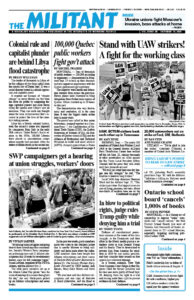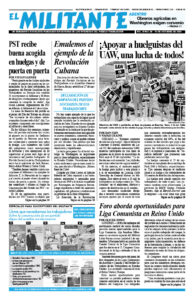MONTREAL — Tens of thousands of public workers — 100,000 according to organizers — demonstrated in Montreal Sept. 23 to back up their demands and win support as negotiations with the Quebec government got underway.
The majority were health and education workers from across the province. Eleven planes were chartered to bring delegations from farther away regions of Quebec. Others traveled up to 20 hours to take part.
The demonstration was very festive, noisy and combative, all at the same time. It was the biggest union action here in many years.
The protest was called by four union federations, grouped together in a Common Front — the Confederation of National Trade Unions (CSN), the Quebec Federation of Workers (FTQ), the Federation of Quebec unions (CSQ) and the Alliance of Professional and Technical Personnel in health and social services (APTS). Arrayed against them is Prime Minister Francois Legault and the Quebec government.
Two other federations are negotiating separately, the Interprofessional Health Federation of Quebec (FIQ) and the Autonomous Education Federation (FAE). Some 565,500 workers are involved in total.
Wages, hours, workloads and respect were the key issues highlighted at the demonstration.
“People are shocked about the 9% over five years offer. The members of Parliament give themselves $30,000!” social work technician Guylaine Charbonneau told the Militant. While the Quebec National Assembly deputies voted themselves a hefty salary boost last spring, workers would get less than 2% a year in the face of a much higher inflation rate.
The Common Front is demanding a three-year contract, with a $100 per week increase for the first year, or the rate of inflation plus 2% — whichever is higher. Then the inflation rate plus 3% the second year and the inflation rate plus 4% the third.
Luc Michaudville, a health service attendant at a seniors’ residence in St-Hyacinthe, southeast of Montreal, described the conditions he and his co-workers face. “I earn $25.63 an hour after 17 years, the same salary as those starting out today,” he said. “After COVID, the government abolished a bonus we got of $1,000 per month.
“At the same time, the health system ‘reform’ that the government plans to implement is aimed at forcing workers to work without respect for seniority,” he said. “To those who stay for a double shift of 16 hours, they offer to put you up in a hotel. If you have children, they say, ask grandparents to take care of them.
“Single-parent co-workers receive disciplinary notices because they take time to be with their child. This is very harsh — a small delay and right away you get a disciplinary notice.”
When the Militant asked him what it would take to win the fight, Michaudville said, “It is the support of the population that can make the difference.”
All the Common Front unions are holding strike votes, with approval ratings so far running over 90%.
The FIQ held a demonstration of 500 union members in downtown Montreal Sept. 6, and another Sept. 25 in front of the constituency offices of Prime Minister Legault.
The FAE announced Sept. 28 that its members had voted to authorize an unlimited general strike if negotiations don’t produce a satisfactory contract.
The government has made it clear negotiations will be tough. The morning of the Common Front demonstration, Sonia LeBel, president of the Treasury Board, declared, “We absolutely must organize work in our schools and hospitals in a more efficient way.” How? “By convincing the unions to give us more flexibility in collective agreements.”
The first time Common Front negotiations took place was in 1972, bringing together the CSN, the FTQ and the Quebec Teachers Federation, which is now the CSQ. The combined workforce of 200,000 demanded a minimum wage of $100 per week. When they refused to obey a law ordering them to end their strike — then the biggest strike action of Canada’s history — the government threw the leaders of the three federations in jail. A spontaneous general strike broke out across the province, with workers taking control in several towns. They won their $100 a week.
Katy LeRougetel contributed to this article.

